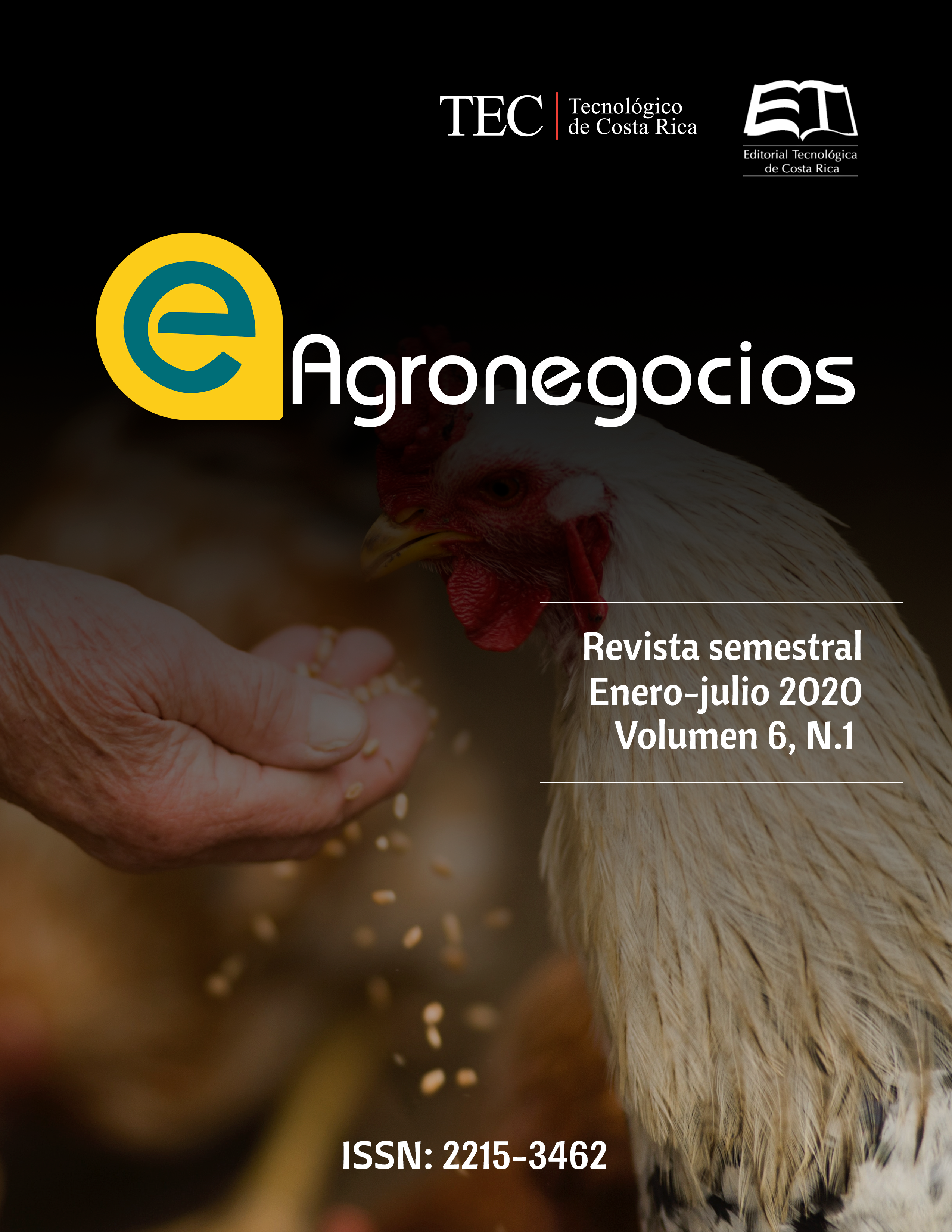Livelihoods approach: coffee farmer’s strate - gies to deal with pressures in Costa Rica’s rural areas.
Main Article Content
Abstract
This article aims to identify the main capitals that affect the number of strategies used by families dedicated to coffee production as a sustainable livelihood in Costa Rica. The data was collecting during 2010-2011, through a random sample of 399 coffee producers located in the cantons of León Cortés, Nicoya, Hojancha and Nandayure, Costa Rica. In our methodological approach, we use the factor analysis technique and a negative binomial regression model to explain the relationship between the number of strategies (dependent variable) and family´s capital. The results of the regression explain how human capital (knowledge and skills) and natural and social capital can determinate the number of strategies adopted by families. The limitation of the proposed model is that it omits other variables, such as context (exogenous difficulties), which could be more related to the number of strategies to subsist in the rural environment that is the same loss of capital.
Article Details

This work is licensed under a Creative Commons Attribution-NonCommercial 4.0 International License.
Las personas autoras conservan los derechos de autor/a y ceden a la revista el derecho de la primera publicación y que pueda editarlo, reproducirlo, distribuirlo, exhibirlo y comunicarlo en el país y en el extranjero mediante medios impresos y electrónicos. Asimismo, las personas autoras asumen el compromiso sobre cualquier litigio o reclamación relacionada con derechos de propiedad intelectual, exonerando de responsabilidad a la Editorial Tecnológica de Costa Rica. Además, se establece que los autores pueden realizar otros acuerdos contractuales independientes y adicionales para la distribución no exclusiva de la versión del artículo publicado en esta revista (p. ej., incluirlo en un repositorio institucional o publicarlo en un libro) siempre que indiquen claramente que el trabajo se publicó por primera vez en esta revista.
References
Abimbola, A & Obayelu, A (2013). Livelihood diversification and welfare of rural households in Ondo State, Nigeria. Journal of Development and Agricultural Economics, 5(12), 482-489, Recuperado en: http://www.academicjournals.org/article/article1384855347_Abimbola%20and%20Oluwakemi.pdf
Bebbington, A., & Batterbury, S. (2001). Transnational livelihoods and landscapes: political ecologies of globalization. Ecumene, 8(4), 369-380. https://doi.org/10.1177/096746080100800401
Babulo, B., Muys, B., Nega, F., Tollens, E., Nyssen, J., Deckers, J y Mathijs, E (2008). Household livelihood strategies and forest dependence in the highlands of Tigray, Northern Ethiopia. Agricultural Systems 98, 147–155. Disponible en: https://doi.org/10.1016/j.agsy.2008.06.001
Bessant, K. (2008). A farm household conception of pluriactivity in Canadian agriculture: Motivation, diversification and livelihood. Canadian Review of Sociology, 43 (1), 51-72. https://doi.org/10.1111/j.1755-618X.2006.tb00854.x
Chambers, R. y Conway, G. (1992). Sustainable Rural Livelihoods: Practical concepts for the 21st Century. IDS Discussion Paper 296, Brighton, UK. Recuperado de : https://www.ids.ac.uk/publication/sustainable-rural-livelihoods-practical-concepts-for-the-21st-century
Dahlquist, R.M., Whelan, M.P., Winowiecki, L. et al (2007).Incorporating livelihoods in biodiversity conservation: a case study of cacao agroforestry systems in Talamanca, Costa Rica Biodiversity and Conservation, 16 (8) 2311-2333. https://doi.org/10.1007/s10531-007-9192-4
Dallmeier, F & Comiskey, J.A. (1998) Forest biodiversity research, monitoring and modeling: conceptual background and old world case studies, Paris, Parthenon Publishing. Disponible en: https://www.cifor.org/library/456/statistical-methods-for-estimating-species-richness-of-woody-regeneration-in-primary-and-secondary-rain-forests-of-northeastern-costa-rica/
Damiani, O (2005). Adversidad y cambio. Estrategias exitosas de pequeños productores de café en Centroamérica.Ruta, San José, Costa Rica. Recuperado de: http://unpan1.un.org/intradoc/groups/public/documents/icap/unpan027866.pdf
Delgado, M (2015). Modelo de regresión binomial negativa (Tesis de grado, publicada). Universidad de Sevilla, España. https://idus.us.es/xmlui/bitstream/handle/11441/40815/Alcaide%20Delgado%20Mario%20TFG.pdf?sequence=1
Department for International Development (DFID) (s.f). Sustainable livelihoods guidance sheets. Disponible en: http://www.livelihoodscentre.org/documents/20720/100145/Sustainable+livelihoods+guidance+sheets/8f35b59f-8207-43fc-8b99-df75d3000e86
Department for International Development (DFID (1999). White Report 1998-1999 Disponible en: https://assets.publishing.service.gov.uk/government/uploads/system/uploads/attachment_data/file/67968/deptreport98-99.pdf
Díaz-Porras, R y Delgado-Ballestero, A (2010). Análisis comparativos de las características económicas y sociales de los productores de café de las zonas de León Cortés y la Península de Nicoya. Serie de Documentos de Trabajo. Disponible en: http://www.repositorio.una.ac.cr/bitstream/handle/11056/8623/informe_comparacion_entre_zonas_080512.pdf?sequence=1&isAllowed=y
Díaz, R, Heakin H, Castellanos E, Jiménez G. (2009). Condiciones para la adaptación de pequeños productores de café ante presiones económicas mediante procesos de “upgrading” en la cadena productiva. Revista Iberoamericana de la Red de Economía Ecológica, 10, 61–72. https://doi.org/10.11648/j.ss.20140303.15
Ellis, F (2005). Rural Livelihoods and Diversity in Developing Countries. Oxford University Press.
Francis, E (2000). Making a Living: Changing Livelihoods in Rural Africa. Routledge, London.
Gecho, Y., Gezahegn, A., Tesfaye, L & Alemu, D. (2014). Rural household livelihood strategies: Options and determinants in the case of Wolaita Zone, Southern Ethiopia. Social Sciences 3(3), 92-104. https://doi.org/10.11648/j.ss.20140303.15
Hope, R., Porras, I y Miranda, M. (2005) Can payment for environmental services contribute to poverty reduction. A livelihood analysis from Arenal, Costa Rica. Disponible en: https://assets.publishing.service.gov.uk/media/57a08c62e5274a27b200117d/R8174CanPaymentsforEnvironmentalServicesReport.pdf
Instituto del café de Costa Rica (ICAFE) (2017). Informe de la actividad cafetalera. Disponible en: http://www.icafe.cr/wp-content/uploads/informacion_mercado/informes_actividad/actual/InformeActividadCafetalera.pdf.pdf
Instituto del café de Costa Rica (ICAFE) (2018). Regiones cafetaleras: Disponible en: http://www.icafe.cr/nuestro-cafe/regiones-cafetaleras/
Jansen, A., Pender,J, Damon, A, Wielemaker, W y Schipper, R (2006). Policies for sustainable development in the hillside areas of Honduras: a quantitative livelihoods approach. Agricultural Economics, 34, 141–153. Disponible: https://onlinelibrary.wiley.com/doi/abs/10.1111/j.1574-0864.2006.00114.x
Kinsella, J. Wilson,S De Jong, F & Renting, H (2002). Pluriactivity as a Livelihood Strategy in Irish Farm Households and its Role in Rural Development . Sociologia Ruralis, 40(4),481-496. Disponible en: https://onlinelibrary.wiley.com/doi/epdf/10.1111/1467-9523.00162
Krantz, L. (2001). The Sustainable Livelihood Approach to Poverty Reduction. Division for Policy and Socio-Economic Analysis-SIDA: Recuperado de http://citeseerx.ist.psu.edu/viewdoc/download?doi=10.1.1.469.7818&rep=rep1&type=pdf
Louman, B, Gutiérrez, I, Le Coq, J.F.,. Wulfhorst, J.D., Yglesias, M y Brenes, C (2016). El enfoque de medios de vida combinado con la indagación apreciativa para analizar la dinámica de la cobertura arbórea en fincas privadas: el caso de Costa Rica. CIENCIA ergo-sum, Revista Científica Multidisciplinaria de Prospectiva, 23 (1). Recuperado de: http://www.redalyc.org/articulo.oa?id=10444319007
Siegel, B. (2005). Using an Asset-Based Approach to Identify Drivers of Sustainable Rural Growth and Poverty Reduction in Central America: A Conceptual Framework. Policy Research Working Paper; No. 3475. World Bank, Washington, DC. Recuperado de: https://elibrary.worldbank.org/doi/abs/10.1596/1813-9450-3475

